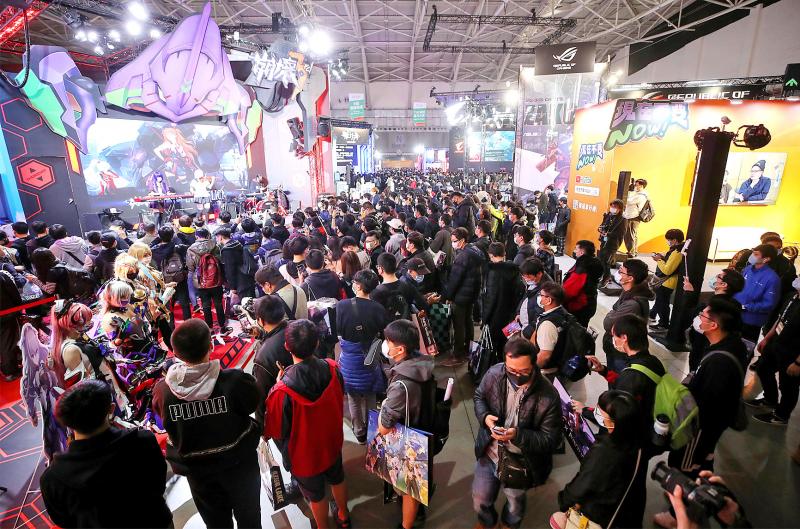The Taipei Game Show opened yesterday with a series of virtual and physical events, and the number of in-person attendees limited to 7,000 per day due to COVID-19 regulations.
There are also fewer exhibitors than in the past, with major industry players such as Sony Corp, Microsoft Corp, Bandai and Google Play skipping this year’s editions over pandemic concerns.
For the first time in the past few years, neither Sony nor Microsoft are presenting their new hardware or software at the event at the Taipei Nangang Exhibition Center, said the Taipei Computer Association (TCA), which organizes the event held through Sunday.

Photo: CNA
The association had originally aimed to present about 900 booths to visitors, but later scaled down the event to 500 booths, it said.
At the gaming fair’s opening ceremony, TCA chairman Paul Peng (彭双浪) said that visitors would be able to test the latest software of about 300 developers from more than 30 countries, either online or at the physical event.
The show features three themed areas: The “Indie House” area showcases 52 games produced by independent developers, the “Board Game Wonderland” features renowned games such as Minecraft, and the “Esports Tournament Stage” hosts gaming competitions.
As part of the fair, the Asia-Pacific Game Summit is held online, featuring the industry’s latest trends, and experts from Taiwan, China, France, Japan, Singapore, Thailand and the US.
The global games market generated US$159.3 billion in revenue last year, up 9.3 percent from 2019, Peng said, citing data released by Dutch firm Newzoo.
In many countries around the world, people spent more time gaming during COVID-19 lockdowns, causing the uptick, he said.
Visitors are required to sanitize their hands and present identification before entering the venue, as well as wear masks at all times and practice social distancing, Peng said.

‘SWASTICAR’: Tesla CEO Elon Musk’s close association with Donald Trump has prompted opponents to brand him a ‘Nazi’ and resulted in a dramatic drop in sales Demonstrators descended on Tesla Inc dealerships across the US, and in Europe and Canada on Saturday to protest company chief Elon Musk, who has amassed extraordinary power as a top adviser to US President Donald Trump. Waving signs with messages such as “Musk is stealing our money” and “Reclaim our country,” the protests largely took place peacefully following fiery episodes of vandalism on Tesla vehicles, dealerships and other facilities in recent weeks that US officials have denounced as terrorism. Hundreds rallied on Saturday outside the Tesla dealership in Manhattan. Some blasted Musk, the world’s richest man, while others demanded the shuttering of his

TIGHT-LIPPED: UMC said it had no merger plans at the moment, after Nikkei Asia reported that the firm and GlobalFoundries were considering restarting merger talks United Microelectronics Corp (UMC, 聯電), the world’s No. 4 contract chipmaker, yesterday launched a new US$5 billion 12-inch chip factory in Singapore as part of its latest effort to diversify its manufacturing footprint amid growing geopolitical risks. The new factory, adjacent to UMC’s existing Singapore fab in the Pasir Res Wafer Fab Park, is scheduled to enter volume production next year, utilizing mature 22-nanometer and 28-nanometer process technologies, UMC said in a statement. The company plans to invest US$5 billion during the first phase of the new fab, which would have an installed capacity of 30,000 12-inch wafers per month, it said. The

MULTIFACETED: A task force has analyzed possible scenarios and created responses to assist domestic industries in dealing with US tariffs, the economics minister said The Executive Yuan is tomorrow to announce countermeasures to US President Donald Trump’s planned reciprocal tariffs, although the details of the plan would not be made public until Monday next week, Minister of Economic Affairs J.W. Kuo (郭智輝) said yesterday. The Cabinet established an economic and trade task force in November last year to deal with US trade and tariff related issues, Kuo told reporters outside the legislature in Taipei. The task force has been analyzing and evaluating all kinds of scenarios to identify suitable responses and determine how best to assist domestic industries in managing the effects of Trump’s tariffs, he

Taiwan’s official purchasing managers’ index (PMI) last month rose 0.2 percentage points to 54.2, in a second consecutive month of expansion, thanks to front-loading demand intended to avoid potential US tariff hikes, the Chung-Hua Institution for Economic Research (CIER, 中華經濟研究院) said yesterday. While short-term demand appeared robust, uncertainties rose due to US President Donald Trump’s unpredictable trade policy, CIER president Lien Hsien-ming (連賢明) told a news conference in Taipei. Taiwan’s economy this year would be characterized by high-level fluctuations and the volatility would be wilder than most expect, Lien said Demand for electronics, particularly semiconductors, continues to benefit from US technology giants’ effort